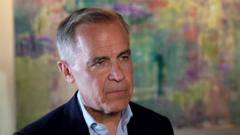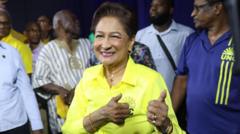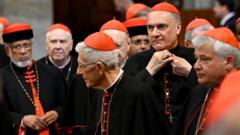As Canada votes, the specter of U.S. policies looms large, influencing the choices of every voter.
Canadians Head to the Polls with U.S. Issues at the Forefront

Canadians Head to the Polls with U.S. Issues at the Forefront
In a pivotal election, Canadian voters are torn between their economy and U.S. relations.
On April 28, 2025, Canadians are casting their votes to select their next government, with Prime Minister Mark Carney’s Liberal Party facing off against Pierre Poilievre’s Conservative Party. A significant factor in this election is the impact of U.S. President Donald Trump, whose aggressive tariff policies towards Canada and provocative suggestions about annexation have resonated deeply with voters.
"Canadians are concerned about their economy and how it intertwines with U.S. relations," explained Matina Stevis-Gridneff, our Canada bureau chief. Economic uncertainty lingers with rising tariffs navigating Canada toward a turbulent financial future. This plight has prompted some voters to blame the Liberal Party, which has governed for the last decade, leading to a potential shift toward the Conservative Party's promises of tax cuts, reduced government size, and regulatory reforms.
However, a considerable segment of the electorate is driven by a desire for stability in the face of U.S. threats. Many see Mark Carney as a seasoned leader who can expertly navigate these uncertain waters, having substantial experience in international economic policy as a former banker. His supporters believe that he is better equipped to protect Canadian interests against U.S. pressures.
With election day unfolding, it appears that voters are influenced by their apprehensions regarding both domestic economic issues and the unpredictable nature of their southern neighbor. As the results roll in, the implications of today’s choices will undoubtedly dictate the future trajectory of Canada’s political and economic landscape in which U.S. relations play a pivotal role.
"Canadians are concerned about their economy and how it intertwines with U.S. relations," explained Matina Stevis-Gridneff, our Canada bureau chief. Economic uncertainty lingers with rising tariffs navigating Canada toward a turbulent financial future. This plight has prompted some voters to blame the Liberal Party, which has governed for the last decade, leading to a potential shift toward the Conservative Party's promises of tax cuts, reduced government size, and regulatory reforms.
However, a considerable segment of the electorate is driven by a desire for stability in the face of U.S. threats. Many see Mark Carney as a seasoned leader who can expertly navigate these uncertain waters, having substantial experience in international economic policy as a former banker. His supporters believe that he is better equipped to protect Canadian interests against U.S. pressures.
With election day unfolding, it appears that voters are influenced by their apprehensions regarding both domestic economic issues and the unpredictable nature of their southern neighbor. As the results roll in, the implications of today’s choices will undoubtedly dictate the future trajectory of Canada’s political and economic landscape in which U.S. relations play a pivotal role.





















